#and under different cultural systems
Text
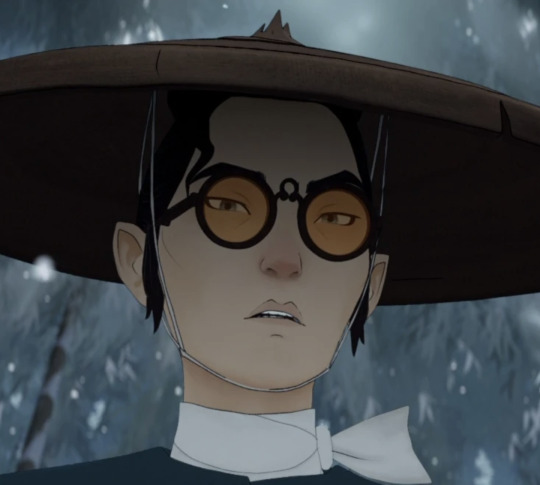
I watched all eight episodes of season 1 of Blue Eye Samurai over the weekend. I then went browsing because I wanted to read some online reviews of the show to see what people were thinking of it and also because I wanted to interact with gifs and art, as the series is visually stunning.
Yet, in my search for opinions on the show, I came across several points I'd like to address in my own words:
Mizu’s history and identity are revealed piece-by-piece and the “peaches” scene with Mizu and Ringo at the lake is intended to be a major character reveal. I think it’s weird that some viewers got angry over other viewers intentionally not gendering Mizu until that reveal, rather than immediately jumping to gender the character as the other characters in the show do. The creators intentionally left Mizu’s gender and sexuality ambiguous (and quite literally wrote in lines to lead audiences to question both) to challenge the viewer’s gut assumption that this lone wolf samurai is a man. That intentional ambiguity will lead to wide and ambiguous interpretations of where Mizu fits in, if Mizu fits in at all. But don't just take my word for this:
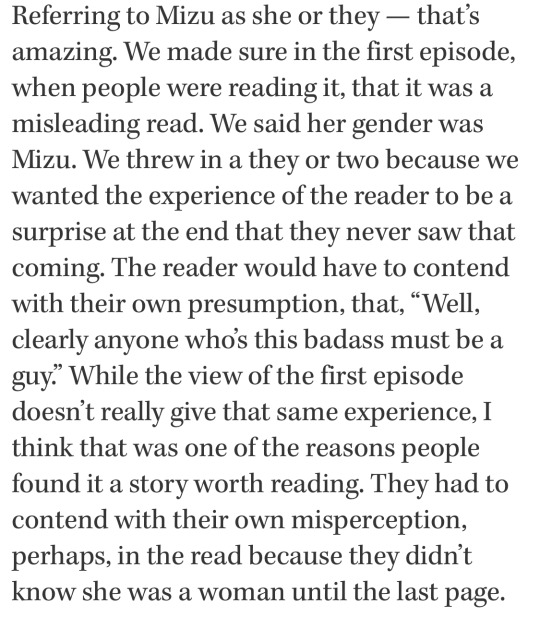
Re: above. I also think it’s weird that some viewers got upset over other viewers continuing to acknowledge that Mizu has a very complicated relationship with her gender, even after that reveal. Canonically, she has a very complicated relationship with her identity. The character is intended to represent liminality in identity, where she’s often between identities in a world of forced binaries that aren’t (widely) socially recognized as binaries. But, again, don’t just take my word for this:
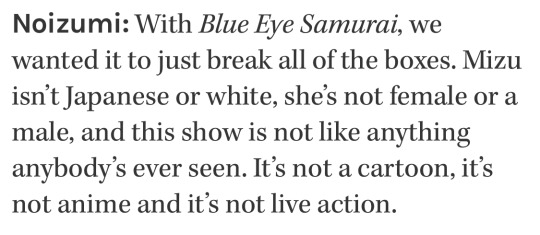
Mizu is both white and Japanese, but she is also not white and not Japanese simultaneously (too white to be Japanese and too Japanese to be white). She’s a woman and a man. She’s a man who’s a woman. She’s also a woman who’s not a woman (yet also not quite a man). But she’s also a woman; the creators said so. Mizu was raised as a boy and grew into a man, yet she was born a girl, and boyhood was imposed upon her. She’s a woman when she’s a man, a man when she’s a man, and a woman when she’s a woman.
Additionally, Mizu straddles the line between human and demon. She’s a human in the sense she’s mortal but a demon in the sense she’s not. She's human yet otherworldly. She's fallible yet greatness. She's both the ronin and the bride, the samurai and the onryō. In short, it’s complicated, and that’s the point. Ignoring that ignores a large part of her internal character struggle and development.
Mizu is intended to represent an “other,” someone who stands outside her society in every way and goes to lengths to hide this “otherness” to get by. Gender is a mask; a tool. She either hides behind a wide-brimmed hat, glasses, and laconic anger, or she hides behind makeup, her dress, and a frown. She fits in nowhere, no matter the identity she assumes. Mizu lives in a very different time period within a very different sociocultural & political system where the concept of gender and the language surrounding it is unlike what we are familiar with in our every-day lives. But, again, don’t just take my word for this:
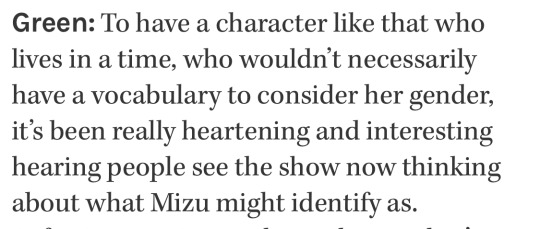
It’s also weird that some viewers have gotten upset over the fact women and queer people (and especially queer women) see themselves in Mizu. Given her complicated relationship with identity under the patriarchy and colonial violence, I think Mizu is a great character for cis-het women and queer folks alike to relate to. Her character is also great for how she breaks the mold on the role of a biracial character in narratives about identity (she’s not some great bridge who will unite everyone). It does not hurt anyone that gender-fluid and nonbinary people see themselves in Mizu's identity and struggle with identity. It does not hurt anyone that lesbians see themselves in the way Mizu expresses her gender. It does not hurt anyone that trans men see themselves in Mizu's relationship with manhood or that trans women can see themselves in Mizu when Mama forces her to be a boy. It's also really cool that cis-het women see themselves in Mizu's struggles to find herself. Those upset over these things are missing critical aspects of Mizu's character and are no different from the other characters in the story. The only time Mizu is herself is when she’s just Mizu (“…her gender was Mizu”), and many of the other characters are unwilling to accept "just Mizu." Accepting her means accepting the complicatedness of her gender.
Being a woman under the patriarchy is complicated and gives women a complicated relationship with their gender and identity. It is dangerous to be a woman. Women face violence for being women. Being someone who challenges sex-prescribed norms and roles under patriarchy also gives someone a complicated relationship with their identity. It is dangerous to usurp gender norms and roles (then combine that with being a woman...). People who challenge the strict boxes they're assigned face violence for existing, too. Being a racial or ethnic minority in a racially homogeneous political system additionally gives someone a complicated relationship with their identity. It is dangerous to be an ethnic minority when the political system is reproduced on your exclusion and otherness. They, too, face violence for the circumstances of their birth. All of these things are true. None of them take away from the other.
Mizu is young-- in her early 20s-- and she has been hurt in deeply affecting ways. She's angry because she's been hurt in so many different ways. She's been hurt by gender violence, like "mama's" misogyny and the situation of her birth (her mother's rape and her near murder as a child), not to mention the violent and dehumanizing treatment of the women around her. She's been hurt by racial violence, like the way she has been tormented and abused since childhood for the way she looks (with people twice trying to kill her for this before adulthood). She's been hurt by state-sanctioned violence as she faces off against the opium, flesh, and black market traders working with white men in contravention of the Shogun's very policies, yet with sanction from the Shogun. She's been hurt by colonial violence, like the circumstances of her birth and the flood of human trafficking and weapons and drug trafficking in her country. She's had men break her bones and knock her down before, but only Fowler sexually differentiated her based on bone density and fracture.
Mizu also straddles the line between victim and murderer.
It seems like Mizu finding her 'feminine' and coming to terms with her 'female side' may be a part of her future character development. Women who feel caged by modern patriarchal systems and alienated from their bodies due to the patriarchy will see themselves in Mizu. They understand a desire for freedom that the narrow archetypes of the patriarchy do not afford them as women, and they see their anger and their desire for freedom in Mizu. This, especially considering that Mizu's development was driven by one of the creators' own experiences with womanhood:
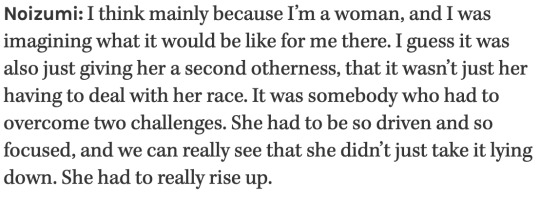
No, Mizu does not pass as a man because she "hates women" or because she hates herself as a woman or being a woman. There are actual on-screen depictions of Mizu's misogyny, like her interactions with Akemi, and dressing like a man is not an instance of this. Mizu shows no discomfort with being a woman or being seen as a woman, especially when she intends to pass herself as and present as a woman. Mizu also shows the women in the series more grace and consideration than any man in the show, in whatever capacity available to her socially and politically, without revealing herself; many of the women have remarked that she is quite unlike other men, and she's okay with that, too.
When she lives on the farm with Mama and Mikio, Mizu shows no discomfort once she acclimates to the new life. But people take this as conclusive evidence of the "only time" she was happy. She was not. This life was also a dance, a performance. The story of her being both the ronin and the onryō revealed to the audience that this lifestyle also requires her to wear a mask and dance, just as the bride does. This mask is makeup, a wedding dress, and submission, and this performance is her gender as a wife. She still understands that she cannot fully be herself and only begins to express happiness and shed her reservation when she believes she is finally safe to be herself. Only to be betrayed. Being a man is her safety, and it is familiar. Being a boy protected her from the white men as a child, and it might protect her heart now.
Mizu shows no discomfort with being known as a woman, except when it potentially threatens her goals (see Ringo and the "peaches" scene). She also shows no discomfort with being known as, seen as, or referred to as a man. As an adult, she seems okay- even familiar- with people assuming she's a man and placing her into the role of a man. Yet, being born a girl who has boyhood violently imposed upon her (she did not choose what mama did to her) is also an incredibly important part of her lived experience. Being forced into boyhood, but growing into a man anyway became part of who she is. But, being a man isn’t just a part of who she became; it’s also expedient for her goals because men and women are ontologically different in her world and the system she lives under.
She's both because she's neither, because- ontologically- she fits nowhere. When other characters point out how "unlike" a man she is, she just shrugs it off, but not in a "well, yeah, because I'm NOT a man" sort of way, but in an "I'm unlike anyone, period," sort of way. She also does not seem offended by Madam Kaji saying that Mizu’s more man than any who have walked through her door.
(Mizu doesn’t even see herself as human, let alone a woman, as so defined by her society. And knowing that creators have stated her future arc is about coming into her “feminine era” or energy, I am actually scared that this show might fall into the trope of “domesticating”/“taming” the independent woman, complete with an allegory that her anger and lack of human-ness [in Mizu’s mind] is a result of a woman having too much “masculine energy” or being masculine in contravention of womanness.)
Some also seem to forget that once Mama and Mikio are dead, no one knows who she is or where she came from. They do not have her background, and they do not know about the bounty on her (who levied the bounty and why has not yet been explained). After their deaths, she could have gone free and started anew somehow. But in that moment, she chose to go back to life as a man and chose to pursue revenge for the circumstances of her birth. Going forward, this identity is no longer imposed upon her by Mama, or a result of erroneous conclusions from local kids and Master Eiji; it was because she wanted people to see her as a man and she was familiar with navigating her world, and thus her future, as a man. And it was because she was angry, too, and only men can act on their anger.
I do think it important to note that Mizu really began to allow herself to be vulnerable and open as a woman, until she was betrayed. The question I've been rattling around is: is this because she began to feel safe for the first time in her life, or is this part of how she sees women ontologically? Because she immediately returns to being a man and emotionally hard following her betrayal. But, she does seem willing to confide in Master Eiji, seek his advice, and convey her anxieties to him.
Being a man also confines Mizu to strict social boxes, and passing herself as a man is also dangerous.
Mizu doesn't suddenly get to do everything and anything she wants because she passes as a man. She has to consider her safety and the danger of her sex being "found out." She must also consider what will draw unnecessary attention to her and distract her from her goals. Many viewers, for example, were indignant that she did not offer to chaperone the mother and daughter and, instead, left them to the cold, only to drop some money at their feet later. The indignity fails consider that while she could bribe herself inside while passing as a man, she could not bribe in two strangers. Mizu is a strange man to that woman and does not necessarily have the social position to advocate for the mother and daughter. She also must consider that causing small social stirs would distract from her goals and draw certain attention to her. Mizu is also on a dangerous and violent quest.
Edo Japan was governed by strict class, age, and gender rules. Those rules applied to men as well as women. Mizu is still expected to act within these strict rules when she's a man. Being a man might allow her to pursue revenge, but she's still expected to put herself forward as a man, and that means following all the specific rules that apply to her class as a samurai, an artisan (or artist), and a man. That wide-brimmed hat, those orange-tinted glasses, and her laconic tendencies are also part of a performance. Being a boy is the first mask she wore and dance she performed, and she was originally (and tragically) forced into it.
Challenging the normative identities of her society does not guarantee her safety. She has limitations because of her "otherness," and the transgression of sex-prescribed roles has often landed people in hot water as opposed to saving them from boiling. Mizu is passing herself off as a man every day of her life at great risk to her. If her sex is "found out" on a larger scale, society won’t resort to or just start treating her as a woman. There are far worse fates than being perceived as a woman, and hers would not simply be a tsk-tsk, slap on the wrist; now you have to wear makeup. Let's not treat being a woman-- even with all the pressures, standards, fears, and risks that come with existing as a woman-- as the worst consequence for being ‘found out’ for transgressing normative identity.
The violence Mizu would face upon being "found out" won’t only be a consequence of being a "girl." Consider not just the fact she is female and “cross-dressing” (outside of theater), but also that she is a racial minority.
I also feel like many cis-het people either ignore or just cannot see the queerness in challenging gender roles (and thus also in stories that revolve around a subversion of sex-prescribed gender). They may not know how queerness-- or "otherness"-- leads to challenging strict social stratifications and binaries nor how challenging them is seen by the larger society as queer ("strange," "suspicious," "unconventional," even "dishonorable," and "fraudulent"), even when "queerness" (as in LGBTQ+) was not yet a concept as we understand it today.
Gender and sexuality- and the language we use to communicate who we are- varies greatly across time and culture. Edo Japan was governed by strict rules on what hairstyles, clothes, and weapons could be worn by which gender, age, and social group, and this was often enshrined in law. There were specific rules about who could have sex with whom and how. These values and rules were distinctly Japanese and would not incorporate Western influences until the late 1800s. Class was one of the most consequential features to define a person's fate in feudal Japan, and gender was quite stratified. This does not mean it's inappropriate for genderqueer people to see themselves in Mizu, nor does this mean that gender-variant identities didn’t exist in Edo Japan.
People in the past did not use the same language we do today to refer to themselves. Example: Alexander The Great did not call himself a "bisexual." We all understand this. However, there is a very weird trend of people using these differences in language and cultures across time to deny aspects of a historical person's life that societies today consider taboo, whether these aspects were considered taboo during that historical time period or not. Same example: people on Twitter complaining that Netflix "made" Alexander The Great "gay," and after people push back and point out that the man did, in fact, love and fuck men, hitting back with "homosexuality wasn't even a word back then" or "modern identity didn't exist back then." Sure, that word did not exist in 300s BCE Macedonia, but that doesn't mean the man didn't love men, nor does that mean that we can't recognize that he'd be considered "queer" by today's standards and language.
Genderqueer, as a word and as the concept is understood today, did not exist in feudal Japan, but the people did and feudal Japan had its own terms and concepts that referred to gender variance. But while the show takes place in Edo Japan, it is a modern adult animation series made by a French studio and two Americans (nationality). Mizu is additionally a fictional character, not a historical figure. She was not created in a vacuum. She was created in the 21st century and co-written by a man who got his start writing for Sex in the City and hails from a country that is in the midst of a giant moral panic about genderqueer/gender-variant people and gender non-conforming people.
This series was created by two Americans (nationality) for an American company. In some parts of that country, there are laws on the book strictly defining the bounds of men and women and dictating what clothes men and women could be prosecuted for wearing. Changes in language and identity over time mean that we can recognize that if Mizu lived in modern Texas, the law would consider her a drag performer, and modern political movements in the show creators' home country would include her under the queer umbrella.
So, yeah, there will also be genderqueer people who see themselves in Mizu, and there will be genderqueer fans who are firm about Mizu being queer to them and in their “headcanons.” The scene setting being Edo Japan, does not negate the modern ideas that influence the show. "Nonbinary didn't exist in Edo Japan" completely ignores that this show was created to explore the liminality of modern racial, gender, class, and normative identities. One of the creators was literally inspired by her own relationship with her biracial identity.
Ultimately, the fact Mizu, at this point in her journey, chooses to present and pass as a man and the fact her presented gender affects relationship dynamics with other characters (see: Taigen) gives this story a queer undertone. And this may have been largely unintentional: "She’s a girl, and he’s a guy, so, of course, they get together," < ignoring how said guy thinks she’s a guy and that she intentionally passes herself as a guy. Audiences ARE going to interpret this as queer because WE don’t live in Edo-era Japan. And I feel like people forget that Mizu can be a woman and the story can still have queer undertones to it at the same time.
#Blue Eye Samurai#‘If I was transported back in time… I’d try to pass myself off as a man for greater freedom.’#^^^ does not consider the intersection of historically queer existence across time with other identities (& the limitations those include)#nor does it consider the danger of such an action#I get it. some come to this conclusion simply because they know how dangerous it is to be a woman throughout history.#but rebuking the normative identities of that time period also puts you at great risk of violence#challenging norms and rules and social & political hierarchies does not make you safer#and it has always been those who exist in the margins of society who have challenged sociocultural systems#it has always been those at greatest risk and who've faced great violence already. like Mizu#Anyway... Mizu is just Mizu#she is gender queer (or gender-variant)#because her relationship with her gender is queer. because she is gender-variant#‘queer’ as a social/political class did not exist. but people WE understand as queer existed in different historical eras#and under different cultural systems#she’s a woman because queer did not exist & ‘woman’ was the sex caste she was born into#she’s also a woman because she conceptualizes herself as so#she is a woman AND she is gender-variant#she quite literally challenges normative identity and is a clear example of what sex non-conforming means#Before the actual. historic Tokugawa shogunate banned women from theater#there were women in the theater who cross-dressed for the theater and played male roles#so I’m also really tired of seeing takes along the lines of: ‘Edo Japan was backwards so cross dressers did’t exist then!’#like. please. be more transparent won’t you?
16 notes
·
View notes
Note
has that other anon ever met an upper class brit because i guarantee they wouldn't feel the same after encountering All That
literally 😭 like comparing classism is so dumb when it’s very much a subjective, varied conversation WITHIN a country let alone amongst different countries but that sentiment can and should coexist with the acknowledgement that british classism Does Not Fuck About
#like u cant lob both country's classim under an umbrella term when comparing them#bc our culture and history with it is so wildly different#like american classism IS there and IS a serious problem the irony here is that literally at no point did anyone say otherwise#so idk why anon got so up in arms lol#but the thing about british classism and the reason it gets talked about so much is because it is such a huge part of our lives#and americans never seem to really get that like even americans that acknowledge it i feel still struggle to grasp the severity of it#I’ve seen a lot of much smarter well-researched people say that class and race in the uk and usa are flipped#so while it’s important to note that BOTH countries have serious issues in both departments the way they manifest is different#so the way race is treated with such severity/extremity in america and racism so normalised and systemic#is exactly how class is here#and the way classism is typically more indirect and underlying in america#is how racism is here#does that make sense? there’s a lot of articles online that explain it better#like im explaining it v briefly and it's obviously not that black and white but that's the general gist of it#and if ur american thinking ‘classism doesn’t FEEL indirect for me so you're WRONG’#then consider im not wrong. that's just how severe it is here for me to be saying it#like idk I can’t stand this narrative anyway of taking away from the original problem to instead have a pissing contest about it#so this will probs be the last I speak about it#but it’s super interesting and it can’t hurt to know more about especially with the prevalence of americacentrism#which is why I responded so harshly to anon to begin with bc like really?#you saw ONE POST that wasn’t about america or american problems and got upset. be serious rn#ask
14 notes
·
View notes
Text
it's terfs all the way down :(
#i think it's time for us all to remember: individual men are not responsible for ur suffering under a patriarchal and misogynistic system!!#if u treat all men as if they are dangerous and sexist and ready to harm u at any moment u are just helping radfems and terfs#the patriarchy is oppressive. distinct men r not oppressors. the end.#i find it astounding how many people in online spaces in general just parrot radfem rhetoric because its seen as progressive#when actually it's just gender essentialism. it's just radfeminism with a slightly different face#it's always the same people who play the most into purity culture as well it's like. do u not see how close to conservative u are?#sigh
2 notes
·
View notes
Text
The tags on my whiteness post said to me that white people (at least those that are racially aware) and colonized natives perhaps have more in common than most people think. Or at least more than they talk about it in public.
Not that they're the same. Misogyny and transphobia are not the same, but they are both veins of oppression in a patriarchy. Similar.
In the same way, that empty hollowness white ppl feel where your culture should be is not unlike what I feel as a native, from what I've read of your accounts. Learning your ancestors chose whiteness and safety and comfort over culture and identity. That now you have nothing because of the colonization and assimilation your grandparents experienced when they got to the USA. Because of whiteness. Because of the power it has even just as a concept in the US.
We experience these for much different reasons and at least your loss bought you privilege.
... but they aren't total opposites either. A hollowness where you know rich history used to be? Having culture but feeling a disconnect where you know More used to be? Feeling like you only have scraps of the culture your family used to have? Clinging to what you can get your hands on? Feeling like it's so detached that it's not really yours?
I get that and I bet I'm not the only one.
The USA's habit for white supremacy, racism, and colonization hurt all of us.
And it will benefit all of us to discard the systems those things built. They're still there and still hurting every one of us.
We can build a future that benefits us all instead as soon as we all start working on that together.
But we can't do that if some of us refuse to admit the system is what's hurting us. If we refuse to acknowledge that even with perfect politicians our Systems would still prevent progress because they are built on outdated and white supremacist ideals we'll just continue to suffer together under those systems instead.
We can't keep attacking each other just because some of us refuse to look at the ideologies fueling our current reality.

25K notes
·
View notes
Text
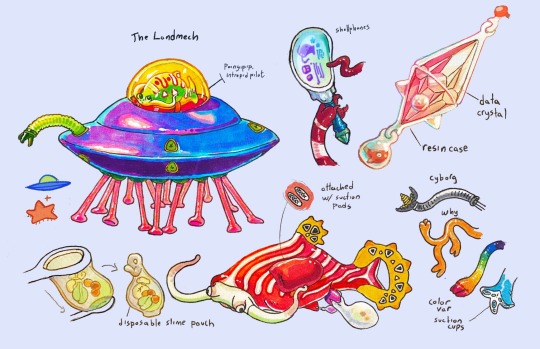
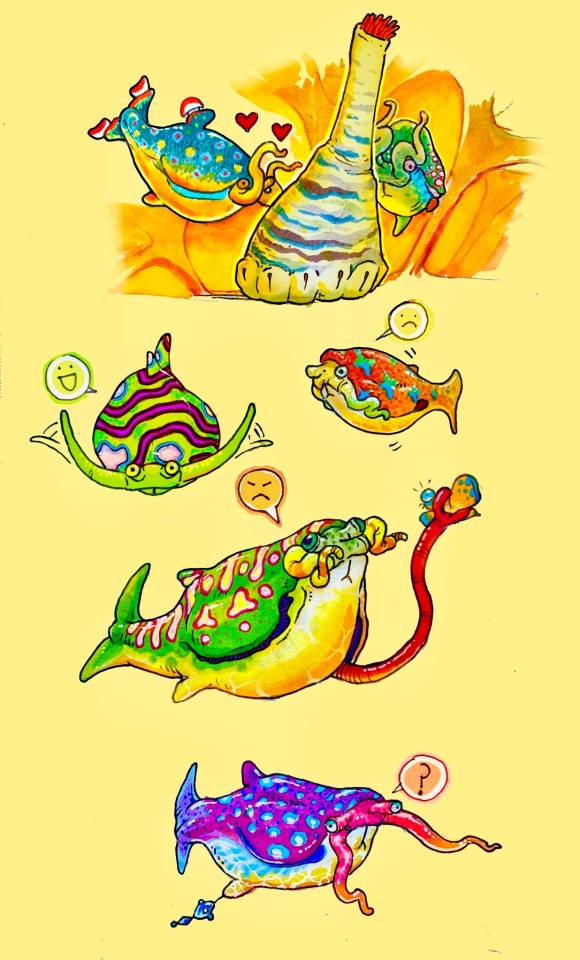
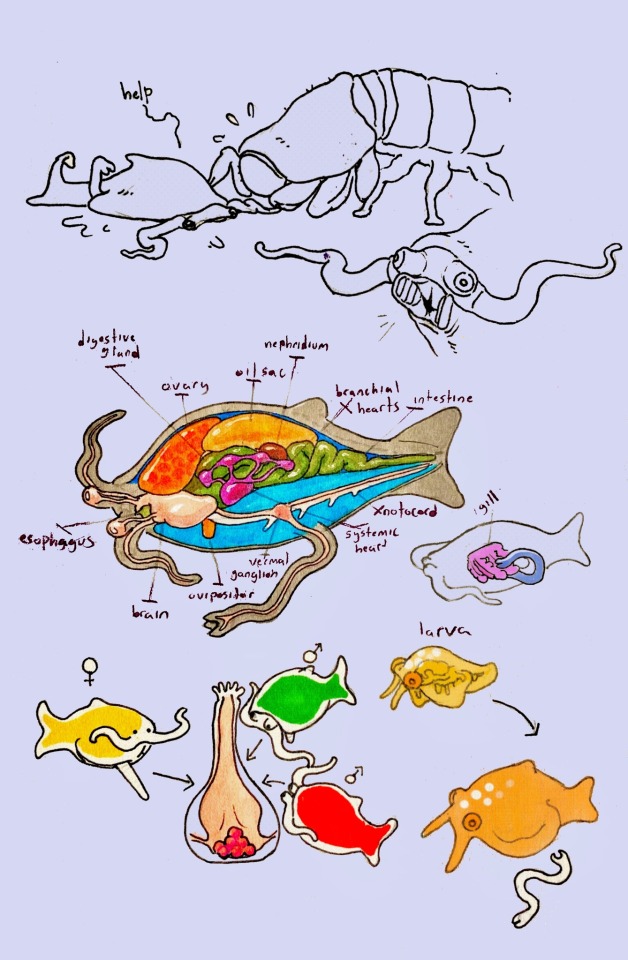
Emerges from my cave to announce I have created a new sophont
Tentatively calling swimslugs for now, as their designs mostly draw from mollusc anatomy. These small, colorful creatures dwell on a high gravity world dominated by shallow golden seas. Electrical engineering came early in their history, inspired by the ability of some of their native animals to generate electrical currents… and their own natural electroreception. The last few centuries have been peaceful and prosperous; their myriad cultures emphasize an exchange of art, culture, and friendly competition to sport the tackiest color schemes imaginable. Due to the high gravity of their world and their own physical limitations as aquatic creatures, swimslugs have a very limited history of aviation and have been generally uninterested in space travel, despite having been digital penpals with another group of sophonts for generations now…
On their biology:
Swimslug life relies on symbioses with two different organisms: a worm and a sessile “tunicate”. The worm (also simply referred to as an ‘arm’) is functionally a parasite; biting into the flank under the gills of its host early in life and fusing with its nervous and circulatory systems. This union allows the swimslug to develop fine motor control over the untethered end of the worm by adolescence. Most swimslugs only host a single arm; two or more become difficult for most individuals to acclimate to and can lead to health issues. Many genetic and cybernetic variations of the arm are available in the current era. The ‘tunicate’ (I will refer to as the Vase) is essential to swimslug reproduction; all parents spawn into the Vase to ensure a safe shelter and a steady current of oxygenated water for the developing offspring. The average swimslug has at least two fathers; the hybridization of multiple sets of gametes is essential to the proper development of their species. Family groups often consist of the egg layer, her family Vase (these can last for generations), and a 3 or 4 mates, though the particulars vary enormously by culture. Their eggs have a relatively low hatch rate; unviable eggs are consumed by surviving larvae shortly after hatching. The Vases themselves periodically produce free swimming larvae that are affectionately kept around dwellings as pets.
Swimslugs communicate by grinding and clacking modified stomach-teeth, as well as percussing on the adjacent ‘oil-sac’ organ that also serves to regulate buoyancy and store energy. They come in a dazzling variety of colors owing to both their complex hybridizations and genetic engineering. Cosmetic nanobots applied to their slime coats enhance their appearance by functioning as artificial chromatophores.
And that’s the gist of em! Many thanks to @nknatteringly for all the idea pitching and bouncing in their early development, wouldn’t have felt half as inspired without ya. Not sure how much further I’ll develop these guys, they exist mostly as a fun diversion to contrast the gritty, low-tech world of the birgs and a love letter to all the sparkly stuff I liked as a kid.
If you’d like to support my art, you check out these links here
———
Patreon
Kofi
Inprnt
1K notes
·
View notes
Text
Why is it that the more I look at Lang Shilong the more I’m getting Yang Jian from Lotus Lamp vibes from him??? Idk I just feel like so much of his motivation centers around filial piety/孝 but not in a Liu Chenxiang way, just specifically in a Yang Jian way
#I know it’s a strange parallel but#the irony of doing the same thing that harmed you unto someone else#like if you think about it#his family was hurt by legal corruption#even though what he was doing in aai can’t really be called corruption it’s still a flaw in the law enforcement system#Yang Jian’s mother was put under a mountain as punishment for disobeying Heaven’s will#but after Yang Jian saves her he essentially does the same thing to his own sister#the irony of someone who suffered because of heavenly will becoming the enforcer of it#very different examples from very different pieces of media but I feel like the connection’s there#very stretched but it’s still there#shi long lang#ace attorney investigations#i should probably read Lotus Lamp after I finish JttW lol#the result of consuming pop culture media while learning about mythology is that you start drawing weird connections
0 notes
Text
Someone on Reddit made the mistake of saying, "Teach me how this conflict came about" where I could see it.
Let me teach you too.
The common perception is that Jews came out of nowhere, stole Palestinian homes and kicked Palestinians out of them, and then bombed them for 75 years, until they finally rebelled in the form of Hamas invading Israel and massacring 22 towns in one day.
The historical reality is that Jews have lived there continuously for at least 3500 years.
There are areas, like Meggido iirc, with archeological evidence of continuous habitation for 7,000 years, but Jewish culture as we recognize it today didn't develop until probably halfway through that.
Ethnic Jews are the indigenous people of this area.
Indigeneity means a group was originally there, before any colonization happened, and that it has retained a cultural connection to the land. History plus culture.
That's what Jews have: even when the diaspora became larger than the number of Jews in Israel, the yearning to return to that homeland was a daily part of Jewish prayer and ritual.
The Jewish community in Israel was crushed pretty violently by the Roman Empire in 135 CE, but it was still substantial, sometimes even the majority population there, for almost a thousand years.
The 600s CE brought the advent of Islam and the Arab Empire, expanding out from Saudi Arabia into Israel and beyond. It was largely a region where Jews were second-class citizens. But it was still WAY better than the way Christian Europe treated Jews.
From the 700s-900s, the area saw repeated civil wars, plagues, and earthquakes.
Then the Crusades came, with waves of Christians making "pilgrimages to the Holy Land" and trying to conquer it from Muslims and Jews, who they slaughtered and enslaved.
Israel became pretty well depopulated after all that. It was a very rough time to live there. (And for the curious, I'm calling it Israel because that's what it had been for centuries, until the Romans erased the name and the country.)
By the 1800s, the TOTAL population of what's now Israel and Palestine had varied from 150,000 - 275,000 for centuries. It was very rural, very sparsely populated, on top of being mostly desert.
In the 1880s, Jews started buying land and moving back to their indigenous homeland. As tends to happen, immigration brought new projects and opportunities, which led to more immigration - not only from Jews, but from the Arab world as well.
Unfortunately, there was an antisemitic minority spearheaded by Amin al-Husseini. Who was very well-connected, rich, and from a politically powerful family.
Al-Husseini had enthusiastically participated in the Armenian Genocide under the Ottoman Empire. Then the Empire fell in World War One, and the League of Nations had to figure out what to do with its land.
Mostly, if an area was essentially operating as a country (e.g. Turkey), the League of Nations let it be one. In areas that weren't ready for self-rule, it appointed France or Britain to help them get there.
In recognition of the increased Jewish population in their traditional, indigenous homeland, it declared that that homeland would again become Israel.
As in, the region was casually called Palestine because that was the lay term for "the Holy Land." It had not been a country since Israel was stamped out; only a region of a series of different empires. And the Mandate For Palestine said it was establishing "a national home of the Jewish people" there, in recognition of "the historical connection of the Jewish people with Palestine and to the grounds for reconstituting their national home in that country."
Britain was appointed to help the Arab and Jewish communities there develop systems of self-government, and then to work together to govern the region overall.
At least, that was the plan.
Al-Husseini, who was deeply antisemitic, did not like this plan.
And, extra-unfortunately, the British response to al-Husseini inciting violent anti-Jewish riots was to put him in a leadership role over Arab Palestine.
They thought it would calm him down and perhaps satisfy him.
They were very wrong.
He went on to become a huge Hitler fanboy, and then a Nazi war criminal. He co-created the Muslim Brotherhood - which Hamas is part of - with fellow fascist fanboy Hassan al-Banna.
He got Nazi Party funding for armed Muslim Brotherhood militias to attack Jews and the Brits in the late 30s, convincing Britain to agree to limit Jewish immigration at the time when it was most desperately needed.
He started using the militias again in 1947, when the United Nations voted to divide the mandated land into a Jewish homeland and a Palestinian one.
Al-Husseini wouldn't stand for a two-state solution. He was determined to tolerate no more than the subdued, small Jewish minority of second-class citizens that he remembered from his childhood.
As armed militias increasingly ran riot, the Arab middle and upper classes increasingly left. About 100,000 left the country before May 1948, when Britain was to pull out, leaving Israel and Palestine to declare their independence.
The surrounding nations didn't want war. They largely accepted the two-state solution.
But al-Husseini lobbied HARD. And by mobilizing the Muslim Brotherhood to provide "destabilizing mass demonstrations and a murderous campaign of intimidation," he got the Arab League nations to agree to invade, en masse, as soon as Britain left.
About 600,000 Arabs fled to those countries during the ensuing war.
Jews couldn't seek refuge there; in fact, most of those countries either exiled their Jews directly, confiscating their property first, or else made Jewish life unlivable and exploited them for underpaid or slave labor for years first.
By the time the smoke cleared and a peace treaty was signed, most of the Arab Palestinian community had fled; there was no Arab Palestinian leadership; many of the refugees' homes and businesses had left had been destroyed in the war; and Israel had been flooded with nearly a million refugees from the Arab League countries and the Holocaust - even more people than had fled the war.
That was the Nakba. The one that gets portrayed as "750,000 Palestinians fled or were expelled!" in the hope that you'll assume they were expelled en masse, their beautiful intact homes all stolen.
Egypt had taken what's now the Gaza Strip in that war, and Jordan took what's now the West Bank - expelling or killing all the Jews in it first.
(Ironically, Jordan was originally supposed to be part of Israel. Britain, inexplicably, cut off what would have been 75% of its land to create Jordan.
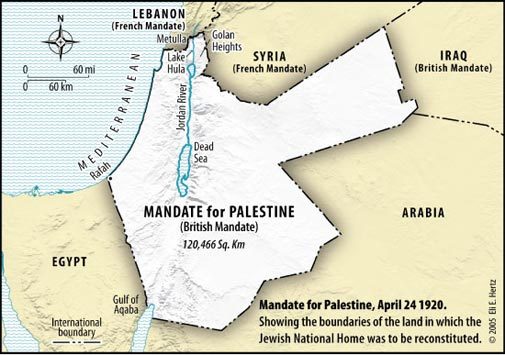
Even more inexplicably, nobody ever talks about it. I've never seen anyone complain that Jordan was stolen from Palestinians. Possibly because Jordan is also the only country that gave Palestinian refugees full citizenship, and it's about half Palestinian now.
Israel is nearly 25% Arab Palestinians with full citizenship and equal rights, so it's not all that different -- but the fundamental difference of living in a country where the majority is Jewish, not Muslim, probably runs pretty deep.)
Anyway: that's why Palestine is Gaza and the West Bank, rather than being some contiguous chunk of land. Or being the land set aside by the U.N. in 1947.
Because Arab countries took that land in 1948, and treated them as essentially separate for 20 years.
Israel got them back, along with the Golan Heights and the Sinai Peninsula, in the next war: 1967, when Egypt committed an act of war by taking control of the waterways and barring Israel from them. It gave the Sinai back to Egypt as part of the 1979 peace accords between Egypt and Israel.
Israel tried to give back the Gaza Strip at the same time. Egypt refused.
Palestine finally declared independence in 1988.
But Hamas formed at about the same time. Probably in response, in fact. Hamas is fundamentally opposed to peace negotiations with Israel.
Again: Hamas is part of a group founded by Nazis.
Hamas has its own charter. It explains that Jews are "the enemy," because they control the drug trade, have been behind every major war, control the media, control the United Nations, etc. Basic Nazi rhetoric.
It has gotten adept at masking that rhetoric for the West. But to friendlier audiences, its leaders have consistently said things like, "People of Jerusalem, we want you to cut off the heads of the Jews with knives. With your hand, cut their artery from here. A knife costs five shekels. Buy a knife, sharpen it, put it there, and just cut off [their heads]. It costs just five shekels."
(Palestinians were outraged by this speech. Palestinians, by and large, absolutely loathe Hamas.
It's just that it's not the same to say that to locals, as it is to say it where major global powers who oppose this crap can hear you.)
Hamas has stated from the beginning that its mission is to violently destroy Israel and take over the land.
It has received $100M in military funding annually, from Iran, for several years. Because Iran has been building a network of fascist, antisemitic groups across the Middle East, in a blatant attempt to control more and more of it: Hezbollah in Lebanon. The Houthis in Yemen.
Iran has been run by a very far-right, deeply antisemitic dictatorship for decades now, which pretty openly wants to take down both Israel and the U.S.
Last year, Iran increased Hamas's funding to $350M.
The "proof of concept" invasion of Israel that Hamas pulled off on October 7th more than justifies a much bigger investment.
Hamas has publicly stated its intention to attack "again and again and again," until Israel has been violently destroyed.
That is how this conflict came about.
A Nazi group seized power in Gaza in 2007 by violently kicking the Palestinian government out, and began running it as a dictatorship, using it to build money and power in preparations for exactly this.
And people find it shockingly easy to believe its own hype about being "the Palestinian resistance."
As well as its propaganda that Israel is not actually targeting Hamas: it's just using a literal Nazi invasion and massacre as an excuse to randomly commit genocide of the fraction of Palestine it physically left 20 years ago.
Despite the fact that Palestinians in Gaza have been protesting HAMAS throughout the war.
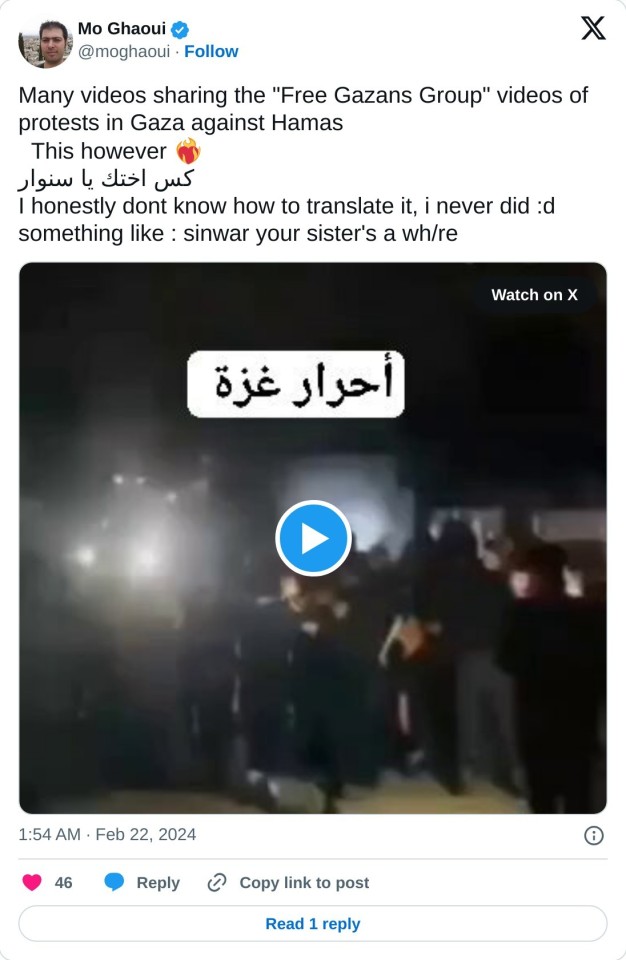
#free palestine#free gaza from hamas#free everyone from hamas it's awful#we want to live movement#free gazans group#center the people directly affected#Ironically it's almost exclusively zionists who know about and support the actual activists in Palestine#because Zionism is a real Jewish term for self-determination not something you can redefine to demonize us#and the pro-hamas movement is inherently both antisemitic and anti-Palestinian#wall of words#jumblr#jewish history#palestinian history
761 notes
·
View notes
Text
I feel like a lot of people don't have a clear distinction in their minds between "immigration" and "colonization".
This causes problems both when decolonization rhetoric gets misinterpreted and derailed, and when (racist/xenophobic) anti-immigrant rhetoric gets a pass due to conflation with decolonization.
Colonization isn't just "moving to a place where people have different laws/customs".
It's also not "observing traditions or customs of your birth culture after moving to a culture where most people's traditions/customs are different."
Colonization involves essentially setting up your own government and legal system in a place where other people are already living, and subjugating the people already there under this colonial government.
The colonizer group has, de facto or de jure, more rights than the indigenous population.
Colonization historically has also involved pressure, sometimes up to and including enforcement on pain of death, to adopt to some extent the colonizer's cultural or religious traditions.
Many individual colonizers have had urgent and legitimate reasons to need to leave the places they lived before. They may individually have had little choice in where they ended up.
However, if they moved to a place where the government is a colonial one that prioritizes them (officially or unofficially) over the indigenous population, they are now part of the colony and participating in colonization. Their children, still prioritized by the colonial government over the indigenous inhabitants, are colonizers also.
Colonization is about taking power over people already living in a place, not about simply moving to a place.
2K notes
·
View notes
Text
Your new roommate is an android. You could tell when you saw them, their skin is pretty obviously artificial material, their eyes glow a little, and they have that voice and those mannerisms that a lot of them have. They're warm to the touch, warmer than any human, most androids are warmer than humans despite the serotypes. This isn't surprising, you've met a lot of androids before, and you know a lot go to this school.
What is surprising is that they don't admit it. They call themself a human, act dismissive towards the idea of androids as part of human society, try to avoid anything that's part of android culture. You adapt pretty quickly to referring to them as a human, but you'll always know they aren't. You assume it's because of bigotry, you know androids still face a lot of social issues, but bigots can still tell they're an android as much as you can. And it's not like things are like they were back in the 21st century, especially in a college in a large city, bigots can't just openly say they hate nonhumans, they're subtle in ways that make pretending to be a human hurt even more. But you are human, so you think it's best not to say anything.
You see how much your roommate sacrifices just to look human. They never show any skin other than their face and hands, which makes overheating even worse. They waste hours trying to fake sleep, when everyone knows they can't sleep, they always make excuses as to why they can't eat any given meal. And you can't even mention nonhumans around them without them being dismissive of anyone openly nonhuman. They don't have solidarity with any other androids, can't participate in any of the things on campus specifically designed for people like them. You want them to be happy, and you know they'd just be happier if they admitted being what everyone knew they were.
There's a lot of nonhumans in your friend group, a lot of clones and cyborgs, and one or two androids. Most of the time you don't think about how they aren't human. But not your roommate, you always think about how they're an android because you have to in order to pretend you think they're human.
And they become so proud of their humanity. Humanity they don't even have. Like they're loving the fact that they can say that they're human, that they can say they're part of the most privileged group in the solar system. It's almost like they're larping as a character, they've mentioned family on Mars at this point, family that you know they physically can't have. It's best to just pretend.
Your roommate knows a lot about certain places, about how certain practices work, places and practices that are horrifying to think even still exist. Places where android suffer in ways that make you feel guilty just to be a human. Places only someone whose been there could know about. It's a miracle this person is in college at all. They don't want to be an android, don't want to be able to be hurt the way only their kind is hurt.
Eventually they cut their face. Cut it deeply enough so that you can see they don't bleed, so that you can see the metal under their plastic skin. They have to walk around like that for a while, they can barely go to class, barely talk to anyone, knowing they can't pass for human. By the time they get the cut fixed everyone knows, well everyone always knew, some people are confused because they didn't even know your roommate wanted to be a human.
When you talk to them again you realize they expected you to want nothing to do with them. They're still uncomfortable around other nonhumans, they don't want to be one of them, but they can still talk to you. They're not even wearing clothing, they don't need it, their only skin is on their head and hands, everything else is raw steel, but they still look themself despite everything. They expected you to see them differently, if anything you see them as an android less now.
When you hug them, it's warmer than any human hug could be.
#android#robotics#robot#robots#scifi#writing#writeblr#worldbuilding#writers on tumblr#my writing#196#urban fantasy#near future#cyberpunk#fiction#origional work#origional content#original fiction#writers
2K notes
·
View notes
Text
something i think gentiles do not get abt judaism is that it’s not a religion in the modern sense. rabbinic judaism as we know it today exists because of the roman destruction of judea and subsequent genocide and expulsion of a huge number of the judeans living there. prior to that, there were judeans who lived outside judea and still participated in many judean practices and followed many judean laws. there was a conversation happening particularly in the rabbinic movement (which was an incredibly small and fringy movement btw) about how to maintain a cohesive identity and community with members of an ethnic group that had stayed in babylon after being released from slavery or had moved to the italian peninsula or to egypt, and that identity was beginning to form. jewish identity was becoming something we might recognize today.
but prior to the roman expulsion and destruction of the temple, that identity had been centered around the land and the temple for very obvious reasons. ancient israel, judea, it was a place and the people who lived there lived under the same governance with the same culture and the same language. it makes sense they’d be a unique ethnic group. another huge part of the identity they’d formed was opposition to occupying forces, greeks, babylonians, assyrians, and finally the romans. eretz yisrael was constantly under occupation. and rebellion was a unifying force for these people. so when suddenly they have no land to defend, no central temple to look toward, suddenly the rabbis’ outlook on “portable judaism” was pretty much the only option if they wanted to remain a coherent group. they started communicating with each other over thousands of miles and multiple continents, discussing how to maintain their identity while in exile. and that is how judaism formed. it wasn’t a belief system that was spread throughout the world like christianity. it was a group of people whose population and homeland was devastated by a brutal occupying force who were trying to hold on to the only thing they had in strange lands where people weren’t always very welcoming: community. particularly in places like eastern and central europe where jews physically looked so different than the rest of the population, their culture was so different, and europeans reacted very violently to that, holding onto their traditions and immersing themselves in the study of how to stay connected is the reason those communities still exist today. they could have just moved to a new place and assimilated into the populations there and we would not have jews today. the reason we have jews today is because of that communal decision, across continents, to stay connected.
464 notes
·
View notes
Note
Hey, I've read your post reply on the ask about the Standing together movement, and there you mentioned that it's incorrect to separate Palestinians and Jews and create a false dichotomy when speaking about liberating Palestine and anti-occupation movement. Could you please elaborate on that? It's a very interesting take that I haven't heard before yet.
So I generally don't understand why we are separating "Palestinian" and "Jews" with no potential for overlap between the two. By separating them, this implies, fundamentally, that there can be no Jewish Palestinians which... is not true. Just even historically, Jewish Palestinians exist and continue to exist.
Why are they mutually exclusive terms within their mission statement when they wish to "stand together"? And I'm not saying this in a condescending manner, I'm saying this because I know there are Palestinians who live in Israel who insist on being referred to as Palestinian. They won't let their Palestinian identity be erased under any circumstances. But they're the only group at risk of having that happen to them. Jewish people are not at risk of having their Jewishness erased for being Palestinian. So how can it be "standing together" when you acknowledge that there is a divide, societally, between perceptions of identity where one is at risk of total destruction by another and you, yourself, do not risk anything?
Where do Jewish Palestinians fall in this dichotomy, exactly? Does that mean no Palestinian will be able to convert to Judiasm without giving up their Palestinian identity? Are Jewish people just innately separated from Palestinians as a whole? If so, what is the thing that categorizes "Palestinian" in their eyes? Is it their religion? Well it can't be, because Palestinians have a diverse array of religions and like I said, people who identity as Palestinian and Jewish exist and are at risk of having their "Palestinian" erased in favor of their "Jewish" one.
Is it their ethnicity? Also can't be, because there is a vast array of ethnicities within Palestinian society. Unless they mean Palestinian=Arab, which is erasure. It erases Armenian Palestinians who play an integral part in Palestinian culture, for example.
So like what is the separation exactly? How are these mutually exclusive categories and how are we defining them? Unless, which is the reason that underlies all this, you mean to say that there is a difference between people who are Palestinians and people are Jewish innately in some unidentifiable manner?
Now, many Palestinians who have Israeli citizenship are not really subject to equal rights lol. And those rights are taken away *because* they are Palestinian. You have to acknowledge that. So when we say "Jewish and Palestinian" in a mission statement where you intend to """solve""" inequality, you're already setting that distinction in your mind that there is an actual difference between these people. So it's problematic in that vein.
But also, the group doesn't address the systematic abuses Palestinians face for YEARS, even before the Likud government. You can't erase that and attribute it to Netanyahu only. You have to address that the very system of Israel was founded on the mass expulsion and erasure of Palestinians, that includes Palestinian Jews.
But again, we have this dichotomy of "Jewish" and "Palestinian," setting into motion that "Palestinian" is somehow an identity that is separate from "Jewish." And through what definitions are we imposing that difference? Through... race science? Through cultural differences? Well, again, what about people who have cultural overlaps. Like if a nonJewish Palestinian marries a Jewish person who is not Palestinian and their child is growing up with both cultures? What does that mean for them? What does that mean for the two people who got married? And even Jewish Palestinians, are they having to give up their Palestinian side for marrying someone Jewish? Won't that cause further inequality within our groups? Isn't this separation just a nicer worded version of segregation in that way?
We have to acknowledge that it is within the state of Israel's interests, at their core, to separate these two identities. So by playing into this narrative, we're continuing the very colonization of history as they try to rewrite the past, implying that Jewish Palestinians especially were not considered a part of Palestinian culture and werent allowed to partake in it.
And it's just, to me, very racist to assume that there can't be overlap between these two types of people. It's happened in Palestine for centuries. But when Balfour comes in and is like "here you go, Jewish people of European cultural heritage, here is your homeland, nevermind the other people who have customs and traditions here, just do whatever you want and get out of Europe," everyone just nods their head like yeah that's reasonable. They didn't even try to learn Palestinian culture and life they just kicked us out. I'd argue that Palestinians would have welcomed Jewish immigrants who sought a safe homeland, so long as they didn't kick us out and enact nearly a century of violence. Palestine is the holy land for a reason! This land is the convergence of faiths and ideas and culture in such a unique way. Labeling it "Palestine" emphasizes that Palestinians are diverse and allow for an overlap of identities!
Essentially, when you try to separate groups of people like this, particularly when the separation of "Palestinians" (or more commonly referred to as "arabs" in Israeli society. Even our identities are erased to homogenize us) and "Jews," it makes it seem like Palestinians are fundamentally anti-jewish and antisemitic. And historically, just doesn't even make any sense.
807 notes
·
View notes
Text
Webcomic rings run by people within the community are cool and you should support them
I've been loudly struggling a little bit with corporate webcomic Stuff lately so I want to mention something positive to balance it out: webrings run by small groups of creators earnestly trying to support each other are slowly making a comeback and I for one am delighted.
If you weren't around for them in the before times, webrings were just some folks who hang out a lot who feature each other on their websites. That's literally it lmao. There's generally no money involved and it only really functions the way it's supposed to if people have control over their own websites AND genuinely want to participate and get excited about other folks' work, which means the practice has pretty well fallen by the wayside over the years in webcomic culture given. Everything. In the rare event someone decides to do something like this it's usually in the form of a link list somewhere on their website; this doesn't usually indicate any sort of mutual support, it's just a list of what the creator is reading themselves.
A webring, though, is an official banner or hub that people gather under intentionally where each member is more or less on equal footing. It's essentially the concept of "a rising tide lifts all boats" put into practice, each creator brings their own audience to the table in a passive, opt-in sort of way that's different from working for a publisher since there isn't necessarily a Top Spot or a paycheck everyone's vying for, and individuals retain autonomy over both their own work and how (if) they promote each other. You're all at your own tables in an artist alley rather than fighting over the table in the front of the book store, essentially.
I have two rings and one collective for you today!

Webcomic Ring was brought to my attention AGES ago by Holly, one of the artists featured there, and I might have brought it up at some point but I'm doing it again lmao. This is exactly the kind of thing you ought to be looking for; a small group of enthusiastic folks having a good time making their weird little comics. You probably haven't heard of much in the catalog, that's PERFECT in the context of webcomics that's where the GOOD SHIT is. Finding something like this is A Gift go dig around in the longboxes for a while.

Then a few people have pointed me in the direction of the KNIFEBEETLE collective and that's neat too! Most of the comics there are already fairly well-known, but the vibes are excellent and I haven't seen a lot of talk about the collective /itself/ outside folks already in the know. I think it's important for this sort of thing to be more visible to folks who aren't terminally steeped in webcomic culture already so here I am telling you about it. You were probably reading several of these before I suggested it, but that's how a webring works! For it to do its job you should take those bigger creators' tacit recommendation of the less popular titles as a sign to go read something new and strange. Wild, I know these are practices held over from the old internet, but I think we should try and bring them back.
Lastly, I want to mention Spiderforest, which is a collective (slightly different from a webring) BUT still a very cool project readers starved for new stuff should pay attention to.

You've probably seen Spiderforest kicking around for a long time already; they're wonderful and have always been an overall positive force in the community in my experience. They really focus on building up a community, and especially welcoming newcomers and helping them get their feet under them. Full disclosure, I've been asked to apply by a few different folks over the years and the only reason I never did is I don't have the ability to participate in their forums and such as frequently as they want their creators to; it's a very good system (from my outside perspective) that might contribute to the community staying mostly healthy in ways that art communities usually don't and I appreciate it a lot!
ANYWAYS that's all I got for now, just trying to balance out some bad feelings I've been having by talking about some good stuff. Please go binge an archive this week.
#long post#contrary to what i say i do love webcomics so fucking much#there are Reasons i'm fucking angry all the time lmao
569 notes
·
View notes
Text
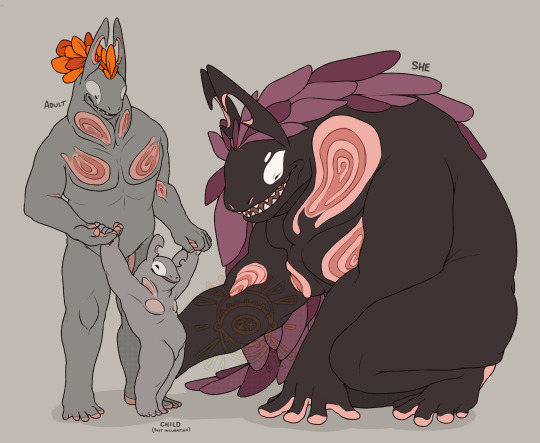
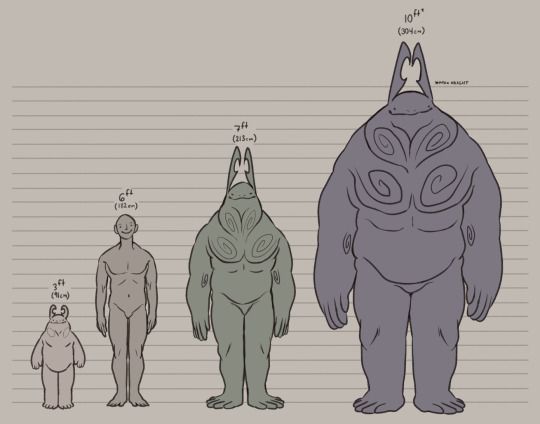
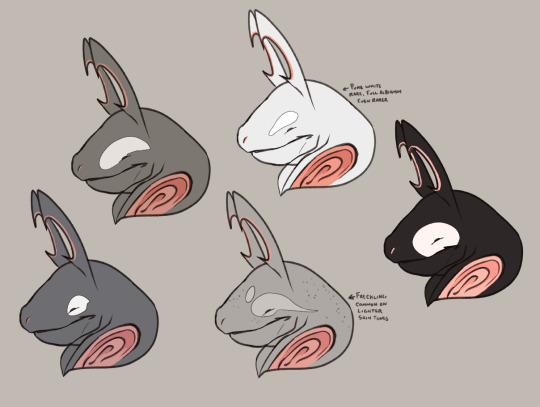

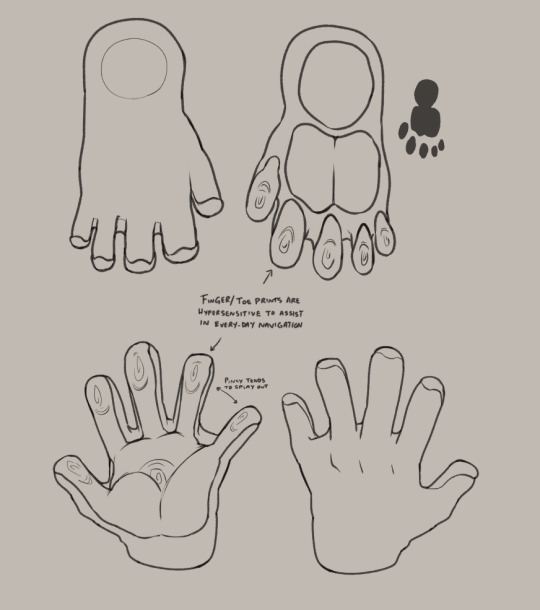
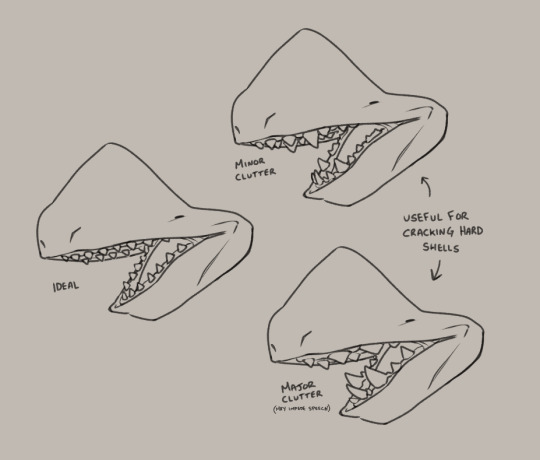
The Audi
Homeplanet: Aodilea (Frontier)
Habitat: Temperate Coastal
Lifespan: ???
Diet: Mesocarnivore (50-70% meat consumption)
Evolving from ancient oceanic odontocetes off the northwestern coastline of the Frontier supercontinent, the Audi are gentle giants and reknowned for their pride, curiosity, and hospitality. Audi have exceptional hearing and tactile awareness to offset their incredibly poor eyesight that gets worse the older (and larger) they get. They also sport a handsome melon to assist in their own form of echolocation, a frequency too low for the human ear to parse. Species with more delicate hearing have often complained of Audi cities being the one of the most audibly overstimulating experiences due to this rumble being incessantly present.
Audi lack any form of dymorphism, as every individual has the capabilities to become pregnant and induce pregnancy.
More about the Audi life cycle under the cut.
The Audi are (assumedly) the longest-living species of sentient lifeforms in the Laurelai Galaxy. It is difficult to pinpoint age in any Audi due to their complete lack of any calendar system; Audi view time as constantly moving forward instead of cyclically repeating, and age records were never anything of value.
Because of their lack of birth dates, Audi categorize their lives into phases. Their first official phase is childhood, with their lack of an 'infant' category caused by the species having two fetal incubation periods: the first organic and the second synthetic. Audi give birth incredibly prematurely due to their narrow pelvic gap, and, to prevent damage and even death to the parent, birth is induced within a two-to-three month time period. Full fetal growth is achieved at ten to eleven months, with the second incubation period done with the asisstance of advanced medical technology that simulates a natural womb. Due to this technology, Audi's infant mortality rate went from 80% down to 25% with three out of four Audi infants reaching childhood.
The second phase is adulthood. What criteria needs to be met for this phase is up to speculation, as Audi seem keen on keeping that information private. What can be assumed is that it's personal for every Audi, and every Audi reaches adulthood at different times. Height ranges anywhere from 6'8" (203cm) to 9'11" (302cm) on average, with older individuals being on the taller end due to Audi constantly (albeit slowly) growing their entire lives.
The final phase is She, a coveted example of Audi excellence and potential. Reaching the phase of She takes an impossible amount of time and physical growth. Every She, of which there are currently six, has a leadership role, ranging from cultural preservation and the arts to science and engineering, with each She taking a 'mastery' of one of these core values of Audi society. An interesting note is that every She is referred to as 'She', making it difficult for outsiders to deduce which of the six She is being referenced. She cap out the Audi height range at an even 10' (304cm), though why this is considered maximum height or how they suppress growth past this point is still being studied.
#art#speculative biology#laurelai audi#<-a tag to use for every species that exists in this galaxy i've made#they do have clothes of some sort this is just the barbie doll version#and every vague thing in this writing is on purpose i promise there's a reason for all of it
451 notes
·
View notes
Text
Things witches keep under their pilllows
Traditionally, witches may keep various items under their pillows for different purposes. Some common examples include herbs or botanicals associated with specific intentions, such as lavender for relaxation or mugwort for enhancing dreams.
Other items could include crystals, charms, written spells, or personal items with symbolic significance. It ultimately depends on the witch's individual practices, beliefs, and intentions.
1. Tarot Cards: Some witches keep a tarot deck under their pillow to enhance their intuition and promote vivid dreams. They believe it can facilitate messages from the subconscious or spiritual realm.
2. Dream Journal: Witches who are interested in dream work might keep a journal under their pillow to record their dreams as soon as they wake up. This practice helps with dream recall and analyzing the symbolism within dreams.
3. Protective Talismans: Witches may place protective talismans or amulets under their pillows to ward off negative energy, nightmares, or unwanted spiritual influences. These could include symbols like the evil eye, pentagram, or specific charms chosen for their protective properties.
4. Magickal Tools: Depending on their craft, witches might keep small magickal tools under their pillows, such as a wand, pendulum, or small ritual knife. They believe these tools can absorb and amplify energy while they sleep.
5. Sacred symbols: Witches may choose to place sacred symbols that hold personal meaning or significance under their pillows. This could be anything from sigils to religious or spiritual symbols associated with their belief system.
It's important to note that the items witches keep under their pillows vary greatly and are highly individualized. Practices can differ depending on personal preferences, cultural backgrounds, and specific branches of witchcraft.
#witchblr#witchcore#witchcraft#witchlife#white witch#beginner witch#witch tips#grimoire#green witch#spirituality#herb magick#book of shadows
1K notes
·
View notes
Text
Dc x Dp Prompt #20: Wishes of a Secret Romantic
Jason doesn’t really advertise it but he’s a romantic at heart. He craves having his own cliche romance with someone who will actually care about him. Sometimes he indulges in his fantasies by reading romance novels or setting up at-home dinner dates that he takes himself on. He often finds himself sighing and wishing he had someone to relate to, that would give him unconditional care and enjoy going on romantic dates with him.
~~~
Desiree doesn’t quite know how she ended up supervising this beautiful mess but she’s not complaining. If anything she has some sweet gossip to share at girls night and a story for Ghost Writer to obsess over.
~~~
It starts like this:
Ever since Frostbite had taken to teaching the young ghost boy lessons on the Realms Culture and Ghost Biology he’d made great strides in his diplomatic and medical skills. His fighting skills were already impressive but were refined under the tutelage of the warriors of Far Frozen. Personally, she thinks he is grooming the Boy to join the Council of Ancients which have taken a more active role in governance now that Pariah has been defeated for a second time.
The boy has been going around and creating treaties with his enemies in which he finds them another outlet for their obsessions. He has already worked out deals with the likes of Technus, Amorpho, and oddly enough a joint deal between Penelope Spectra and Walker.
Technus was allowed to indulge in his technological creation so long as he was supervised by the Pharoah boy or doing on of the preapproved tasks of mischief, such as causing mild inconvenience to the bastards in white.
He had set up Amorpho with a “Cosplay TikTok” on which he was able to show off his different forms and get recognition for them. He’d amassed a large following thespians and costume artists who greatly admired him.
Due to his position on the Council, the Boy managed to get Spectra and Walker to agree to take part in the new justice system the Council had been setting up. Walker could run his prison so long as he abided by the rules and scentence lengths set by the Council. And Spectra was free to torment those whom the council deemed the worthy of the worst punishments. Many ghosts had grievances against living and non-living menaces, last she heard, there was a whole list for Spectra to go down. Currently, she was in another universe tormenting a man named Eobard Thawne, who went by a ridiculous name called the Reverse Flash. Once she had her fill of torment, they would be taken to Walker’s prison.
The Ghostling continued to do this with many of his former adversaries until he came knocking at the door to her lair. She was well aware of what the GhostBoy would want, and was curious as to what he could offer her.
She granted him the grace of her presence and was charmed by his earnest nature. He genuinely wanted to know her story and obsessions so that he could find the best way to help her. She revealed to him it was not Desire as many people assumed but Fulfillment. She wanted to people to attain their desires in place of how she had been unable too. But there are consequences to wish granting so there’s only so much the Boy could do.
The ghostling had been unbelievable smug win he wished that her wishes wouldn’t have catastrophically negative outcomes. When she granted and skeptically tested this wish she found it had worked. The boy grew even more smug.
Of course balance had to be maintained so her power became not weaker per say, just more indirect. During their trial run, Desiree was granting me the wish young boy had wished for a large cookie. Instead of instantly summoning a 50 foot tall cookie as she would have previously done, she simply caused his mother to have the desire to bake cookies and then had two of them fuse together in the oven creating one larger cookie.
A bit more round about than she prefers but it got the job done.
The two brokered a deal that would allow Desiree to travel into the mortal realm and grant the wishes she desired to, so long as the would cause catastrophically negative outcomes in the future. Young Phantom had even gone as far as to direct her to the so-called Make-A-Wish foundation in which she could find many deserving children to fulfill the wishes of.
~~~
One night Desiree had been flying through the mortal realm to visit a friend, a city spirit she hadn’t seen in ages. As she flew over the city a strong sense of longing and desire resonated with her core. Where there was desire there was someone with a wish. Invisible, she flew down to the source of these feelings to investigate.
She ended up out side the window of a building that held longer traces of death and her friends magic. She peered through to see a young man putting the finishing touches on a lavish dinner. She observed as he created a beautiful meal with an air of melancholy before pouring himself a glass of wine and turning on his television to watch mediocre romantic comedies. Intrigued by this young man, Desiree decided to lurk and observe for a while, perhaps he would soon reveal the wish his heart yearned for?
-
Jason sighed into his Osso Bucco as another romantic comedy began to play. Man he really was bumming himself out wasn’t he. He shook his head and took a sip of his wine. He winced slightly as some cringey kids’ movie called How to Build A Better Boy appeared on screen. How had that even gotten in his queue? However, his laziness won out and he made no move to change it resigning himself to a hour and a half or so of second-hand embarrassment and semi-decent acting.
As he watched the best friend girl make a virtual boyfriend based on her friend, the main girl’s, preferences and huffed to himself. Oh if only things could be that easy. He hummed to himself adding on his own thoughts to the teen girl’s rambling list.
“ If only, sister. I’d wish for a sensitive and sweet guy too. Someone who wouldn’t mind death jokes, or my odd hours. Someone to I could just relax and nerd out with. Someone who’d go on romantic dates with me so I wouldn’t have to sit here eating this nice dinner on my own. Yeah, I’d wish for my perfect guy too.”
Suddenly, a chill washed over Jason and his hair stood on edge. He whipped his head around in search for an intruder only to see nothing there. He scanned the apartment suspiciously before his eyes landed on an open window. He sighed, reassured it was just a draft and turned back to the movie.
~
Desiree was touched by the earnest desires of the young man who was touched by both death and her friend’s magic. It almost reminded her of her own desires for romance while she was still living. Perhaps she would stick around to see how this wish played out for the young man~?
~
Miles away, something sparked in Danny Fenton, helping him make his final decision on which of the colleges that accepted him he should attend.
#long post#dc x dp#dead on main#jason todd#danny phantom#danny fenton#desiree#jason todd is a romantic#romantic jason todd#jason todd deserves to be happy#accidental matchmaking#desiree and lady gotham are friends#desiree grants jason’s wish#desiree doesn’t know it yet but she’s low key gonna become jason’s personal fairy godmother#desiree is fond of jason#aha aha what if I made lady gotham and desiree jason’s moms#jk jk... unless?#Strega’s dc x dp prompt
238 notes
·
View notes
Text
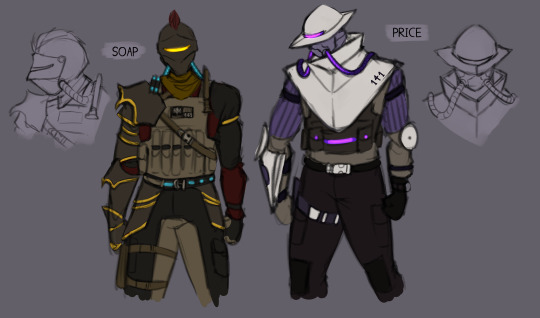
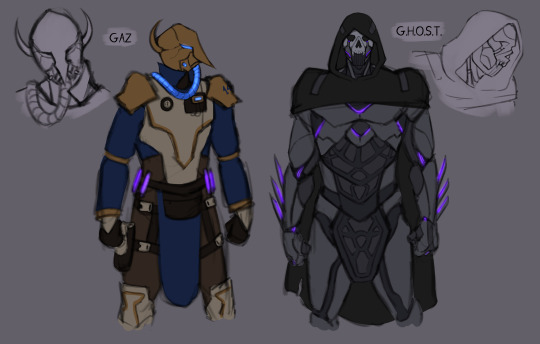
More Cyberknight AU sketches... I can already tell I'll have to do something with this universe, considering how much I'm thinking about the world building, plot, characters...
Speaking of world building, gonna write down some of it under the cut, if anyone's interested... (it turned out to be....... a lot..............)
Alright, so obviously there's a lot of influence of medieval knight armor, so my first line of thought was adding some sort of magic system. Initially I was like "well, can't use the magic system I have in my original stories, since Revenant AU is based on that, and if I do that again it would be way too similar". I considered scrapping magic off this AU completely, because I didn't think I could make a magic system different enough from rev AU to not be just the same thing but To The Left. And then it hit me.
COD already has a magic system. In Zombies.
Now, the Aether is not really treated as magic, more like scientific phenomena, but it's practically magic, taking to account the field upgrades, and its effect on living being (zombies, and special zombies like manglers, mimics, disciples...).
And the moment I thought about that, everything started clicking together.
Picture this, post apocalyptic world. Operation Deadbolt failed, and the Aether spread from Urzikstan to the rest of the world. Decades later, humanity found ways to ward it off, leaving swaths of land infected with the Aether, quarantined away from the remaining human cities.
This quarantine isn't perfect, however, and certain Aether forms threaten the delicate peace on the cities. This is where the Cyberknights come in.
Using Aether portals (the ones in-game), they teleport deep into Aether territory, and with motorcycles traverse the land, tracking big Aether forms that pose a big enough threat.
Scientists have found ways to build weapons made of Aether. The more in the metal, the better, so guns were now dwarfed by the power of swords and spears. These new weapons use the Aether of fallen enemies as a power source, for charging a powerful attack (in-game they're called Field Upgrades, and I'm giving them a lore explanation as to why it takes a while to charge them, and why it charges by killing zombies).
There are a few types of Aether forms: Aether-Mechanical (think the Manglers from the game), native Aether forms (Disciples, mimics, Aether worm), and infected Aether forms (humans turned zombies). Because of that, each unit must include at least one of each: a mechanic (in charge of equipment, and the mechanical nature of Aether-Mechanical forms), an Aether expert (for teleporters, and Aether forms in general) and a fighter (acting as sort of a tank as the others work).
I also thought a bit about the 141's weapons and field upgrades, so here's a little blurb on each:
Soap - Wields 2 short swords, the right with Cryo Freeze (Ammo Mod in-game), and the left with Napalm Burst. Field Upgrade is Frenzied Guard: Killing zombies grants a shield, but all hostiles are attracted to Soap once he turns it on. This Field Upgrade is usually reserved for fighters, which Soap used to be, but he's now acting as a mechanic for the 141 unit.
The blue and red in his design are for his ammo mods, ice and fire, and the helmet obviously resembles his hairstyle. Originally I went for something more Scottish, but it didn't look exactly like I imagined (Scottish warriors were notorious for not wearing a lot of armor, and they kinda scared other cultures, sometimes carrying the head of their enemies to intimidate others. So metal haha).
Gaz - Wields a spear, that uses Aether as a sort of magnetic force, meaning he can throw it and pull it back. Field Upgrade is Energy Blast: turning it on will create a force field around him, pushing and injuring anyone attempting to get close to him (this is a modified version of the Energy Mine in MWZ, just thought I can make it more interesting).
The purple on his belt are Aether crystals, as he's the 141's Aether expert. The "horns" on his helmet are actually a detector of Aether forms (and they're there to look cool).
Price - Wields a foldable shield, and a short sword, with Brain Rot applied to it (Brain Rot will make a zombie turn to your side for a short while, attacking hostiles for a few moments before their head explodes). Field Upgrade is Healing Aura, which will... heal everyone around him, obviously. Price is the fighter of the 141.
Price is nicknamed "The White Knight", as a well known fighter with a long history of felled Aether superforms. The piece on his right arm (his right), is his shield in folded form.
G.H.O.S.T. is a robot, powered by Aether, the first of his kind. This means he uses 2 Field Upgrades: Aether Shroud, making him go invisible for a short while, and Tesla Storm, which channels bolts of electricity through his body and his teammates', as well as his knives, so he makes sure to throw them in tactical positions before activating this. The electricity doesn't hurt his teammates, their armor makes sure of that, but it will kill lower Aether lifeforms, and damage the stronger ones. G.H.O.S.T. is the secondary fighter of the 141.
G.H.O.S.T. - Wields several knives, that use a similar technology to Gaz's spear, meaning he can pull them back at will.
[Edit: forgot to mention that the things sticking out of his forearms are his knives]
His design is based on the "Gilded Ghost" skin in-game, without the gilded part lol. The purple parts are the Aether powering his mechanical body.
For the story, I have something planned... but I don't wanna spoil you lmao. I was thinking a lot about Soap, who (if I make a fic which lets be honest I probably will) will be the POV.
Soap joins the 141 mainly as a mechanic. Each unit has a fighter, a mechanic, and an Aether expert. Gaz is the Aether expert, and Price is the fighter, G.H.O.S.T. acting as a support for Soap when the unit splits up. Soap comes from the northern territories, so he's very different from the rest in terms of his background, basically an outsider. He used to be a fighter, but a knee injury forced him to change positions. All members of a unit can fight, but it's not their main job, bar the fighter of course. He feels bitter about that.
He finds in G.H.O.S.T. an odd companionship, considering the robot can't feel. His AI is exceptionally advanced, so he does talk unnervingly, almost like a human. Soap often just rants, talking about his home city, about the life he used to have, and G.H.O.S.T. listens with no complaints, not that a robot can really complain.
It all changed on one fateful deployment, where Soap and G.H.O.S.T. get separated from the rest, and Soap finds the truth behind G.H.O.S.T.'s technology...
That's all I'm gonna leave you with for now, haha. As you can probably tell, I spent a lot of time playing Zombies in MW3 (idk I just find it a good way to relax), so I really enjoy trying to think of explanations for each mechanic, and how the world would look like 50 years in the future.
#call of duty modern warfare 2#cod mw2#cod soap#cod ghost#cod gaz#cod price#john soap mactavish#simon ghost riley#kyle gaz garrick#john price#cyberknights au#cod zombies#cod mwz#cod fanart
216 notes
·
View notes